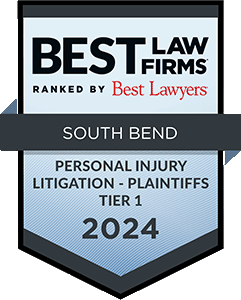 Being involved in a car crash is traumatic, but if you suffer injuries as well, taking steps to get back to living your life can quickly become overwhelming. Seeking medical care after your accident is a necessary part of any attempt to recover compensation. Making sure your doctor’s notes accurately reflect your injuries and the subsequent care you receive can also help strengthen your claim.
Being involved in a car crash is traumatic, but if you suffer injuries as well, taking steps to get back to living your life can quickly become overwhelming. Seeking medical care after your accident is a necessary part of any attempt to recover compensation. Making sure your doctor’s notes accurately reflect your injuries and the subsequent care you receive can also help strengthen your claim.
Below you can read about Pfeifer, Morgan & Stesiak’s guidelines for understanding more about how doctor’s notes can help to optimize your recovery and provide credible evidence if you later decide to pursue a personal injury lawsuit.
How Doctor’s Notes May Help Strengthen Your Injury Claim
Pursuing compensation for injuries and other damages caused by a car crash involves, in part, gathering evidence that will help to support your claim. Obtaining proper treatment for your injuries and following through with your physician’s recommended plan of care is also important. However, another piece of evidence that deserves attention is the content of your medical records, which includes the details of your diagnosed injuries, treatment plan and more.
In addition to protecting your health, getting immediately examined by a medical doctor helps to link your injuries to the accident that caused them. If you wait to seek medical help for hours, days or weeks, then you will have a much harder time proving where your injuries occurred. The insurance company and others will have room to argue that your injuries could have happened anywhere.
Doctor’s notes can help to strengthen your claim by:
- Providing an official record of your injuries documented by a credible witness (your doctor)
- Creating an ongoing paper trail of your injuries including ongoing diagnostics, documented extent of damages and prescribed treatment.
- Giving the insurance company indisputable evidence and documentation of your injuries
Asking The Right Questions To Optimize Your Care and Your Claim
After an accident, going to the hospital or doctor to get examined is a step in the right direction, but it is not the only consideration for ensuring you get the right care.
Here are two steps that can further help to optimize your care:
Describe Your Injuries Honestly and Accurately
If you walk into a doctor’s office and simply tell them you got hurt in a car accident, you are only giving them a fraction of what they need to know. Remember, no matter how good your physician is, he or she was not there when you were injured. Be honest and do not exaggerate but do provide specific details to give your physician more insight about the accident and what types of injuries, visible or internal, that you may have sustained.
For example, if you let your doctor know you were hit by a car going at high speed versus a slow speed fender bender, your physician may be more concerned about the likelihood of internal injuries and order additional diagnostic testing. This step alone is critical to being proactive about protecting your health.
Ask The Right Questions
After talking to your physician about how the accident happened, it is important to provide detailed, accurate responses to his or her questions about your injuries and any symptoms you are experiencing. There are also some additional questions that you can ask your doctor to help you understand more about your injuries and what to expect during your recovery. So, what are the right questions, and how can this help your claim?
Here are a few of the most relevant questions to get you started:
- What is your diagnosis for my injury?
- Will I make a full recovery?
- How long could my recovery take?
- Will I need any prescriptions?
- How long before I can go back to work?
- Do you know how much this treatment will cost?
Will I need additional care, such as physical therapy to improve my chances for healing?
Even though your doctor will add notes about your diagnosis, care plan, and medications in your medical chart, it is a good idea to take your own notes. Be accurate and specific and be sure to include the date you were seen and the name of your doctor.
What Details Should Be Included in Your Doctor’s Note For Work?
If your doctor tells you that you will need to initially recover from your injuries at home, you will likely need him or her to provide a doctor’s note for your employer. Ask your doctor to include the following information on your note:
- Your doctor’s official diagnosis
- How the extent of your injuries will impact your ability to work
- Estimated time for recovery
- What treatment plan he or she recommends
Getting these details about your care included in your doctor’s note helps to ensure your employer provides the sick time and wage benefits you need during your recovery.
Contact an Experienced Lawyer For Assistance With Your Claim
Our trusted South Bend personal injury lawyers are prepared to answer your legal questions about recovering compensation for your injuries in a completely free initial consultation. There is no obligation to pursue a claim following this meeting. However, if you retain the services of Pfeifer, Morgan & Stesiak, you will have no out-of-pocket costs to pay. We charge no fees unless we first obtain compensation on your behalf.
Our offices are available to take your call 24/7, so we encourage you to call and arrange for your free claim review today.
Pfeifer, Morgan & Stesiak. No upfront costs. Call: (844) 678-1800











